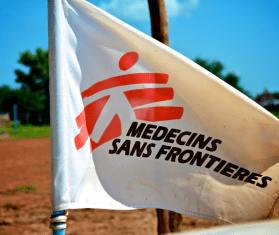The sky over El Manchén is as blue as ever. This suburb of Honduras’ capital, Tegucigalpa, is still bustling as people jostle to get to work and cars honk in the heavy traffic. To the naked eye, this densely populated area seems much like it did a year ago. But a Doctors Without Borders/Médecins Sans Frontières (MSF) team has been working hard to make a microscopic change that could save lives.
A recent test found that 8 out of 10 mosquitoes caught in El Manchén carry Wolbachia, a harmless bacteria that’s found in over 50 percent of insects. One year ago, almost none of the local mosquitos were carriers.
This matters, because Wolbachia dramatically reduces the likelihood that mosquitoes will transmit diseases like dengue fever, a potentially deadly disease that affects an estimated 100 million to 400 million people worldwide each year. The team at the MSF Arbovirus Prevention Project released over 8 million mosquitoes carrying the bacteria in El Manchén last year. The team’s hope was that the mosquitoes would thrive, reproduce, and pass Wolbachia to the next generations, radically reducing the rate of dengue in the area.

A trial not without risk
“As we continued to release mosquitoes, this meant there were more and more of them in the area, which caused distress to the local communities,” said Edgard Boquín, coordinator with the project. “At the same time, another dengue epidemic broke out in the capital. This made it more difficult to approach people about dengue, but by engaging them directly in the activities, we were able to do everything as planned.”

“We’ve been working in partnership with local communities, Honduran health authorities, the National Autonomous University of Honduras (UNAH), and the World Mosquito Program (WMP),” adds Boquin, “It’s been a real team effort! This is the first time that MSF and the WMP have worked together on prevention of arboviruses [viruses transmitted by mosquitoes,] like dengue. Our strength in community involvement and the WMP's technical expertise complemented each other to make this a reality.”

So, has the Wolbachia method worked?
El Manchén previously had among the highest rates of dengue fever in the city. However, in the past year there have been fewer cases than in previous years, and lower rates compared to other areas of the city.
“It’s still too early to claim victory,” Boquín cautions. “We tested 294 mosquitoes in September, and we were really pleased that 85.7 percent were carriers of Wolbachia. However, these are preliminary results. In the first quarter of 2025, definitive tests will be carried out that will tell us to what extent this strategy has served to reduce the impact of dengue in El Manchén.”
Although he’s careful about showing too much excitement too soon, Boquín is hopeful. “This is undoubtedly promising,” he says, with a smile of satisfaction.
“If we continue this path, the Wolbachia method will be a positive tool to reduce dengue in the country,” he explains. “For a long time we have seen how people have suffered from dengue, but now we hear positive stories from the community that something is changing after the Wolbachia release; this gives hope to those who has experienced dengue or have seen someone close to them get sick.”
We speak out. Get updates.
Why fighting dengue matters
Dengue is a public health crisis in Honduras and the Americas. In Honduras, outbreaks are growing increasingly severe with more than 10,000 dengue cases reported each year.
It is also an important global health threat and is rapidly spreading with reported incidence increasing 30-fold over the past 50 years. No specific treatments are currently available, and no vaccines have yet been produced that provide sufficient protection against infection. Today, more than half the world’s population is at risk, and it is expected that another billion people will be exposed to dengue fever in coming decades due to climate change.




